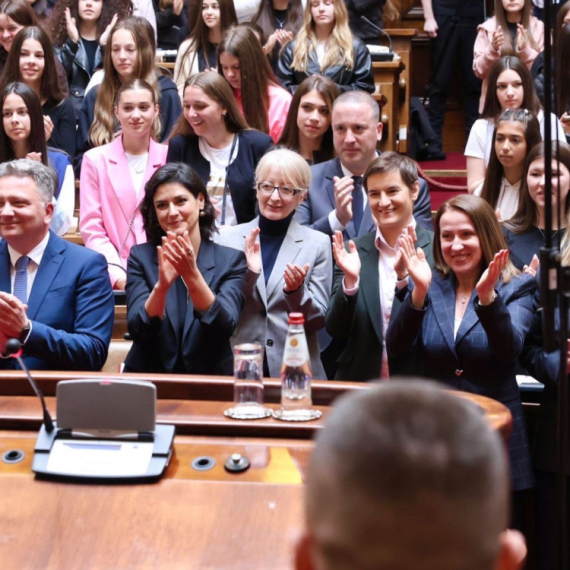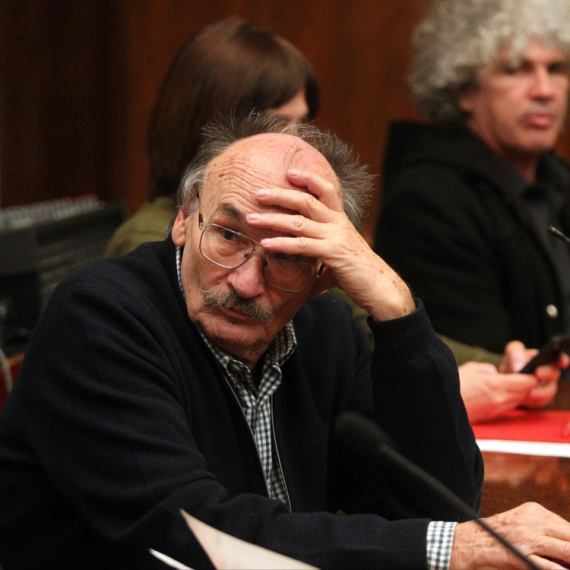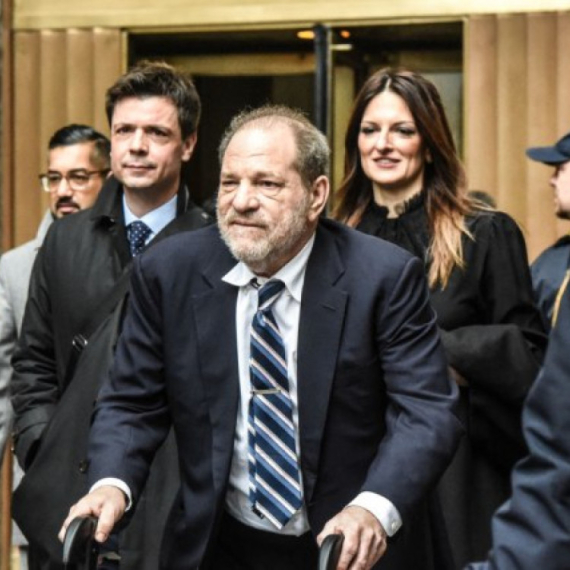“Freedom of media important for Serbia’s EU accession”
The implementation of the Media Strategy and freedom of media will be a part of the European Commission’s April report on Serbia, Vincent Degert has stated.
Wednesday, 23.01.2013.
11:46

BELGRADE The implementation of the Media Strategy and freedom of media will be a part of the European Commission’s April report on Serbia, Vincent Degert has stated. The head of the EU Delegation to Serbia stressed that the issue of media would certainly be one of the issues Brussels would take into account while deciding whether Serbia should be given a date for the beginning of the EU accession talks. “Freedom of media important for Serbia’s EU accession” Degert noted that the European Commission did not want to interfere with a dispute between Democratic Party (DS) leader and Belgrade Mayor Dragan Djilas and tabloid Kurir. “It is clear that the comprehensive implementation of the Media Strategy, as well as combat against corruption and the rule of law, will be a part of the EC’s report,” the head of the EU Delegation underscored. He confirmed that freedom of media would be among issues that would be taken into account during the decision-making on Serbia’s date for the start of the EU talks and reiterated that the adoption of the Media Strategy more than a year ago had been important step that helped Serbia get the candidate status. “The implementation is important now,” Degert said and noted that the EU Delegation was encouraged on one and concerned on the other hand. “We are satisfied that the Culture and Information Ministry has formed a working group to work on the Law on Public Information in which representatives of media are active,” he said, adding that he believed that a public debate on the draft law would soon be held. “However, we are concerned about the law on electronic media, especially about a situation with public broadcasting companies whose TV subscription is declining,” Degert said. “Three years ago, the payment of subscription was 50 percent and now is below 30 percent,” he stressed. The head of the EU Delegation to Serbia expects that media laws will solve the issue of transparency of ownership in the media and state aid to media. “We want to see the end of the state’s involvement because the public financing is used on different levels for support to media and there is a question of influence on them, as well as independence of editorial policy,” he explained. Degert added that the Ministry was looking for a solution for Tanjug news agency that offered the same service and products as privately-owned agencies but got almost EUR 2mn from the state budget every year, which was not good for the competition. According to him, Serbia should also respect a timeframe for digitalization. “The EU’s deadline for digitalization is mid-2015 and we have invested around EUR 10mn in technical equipment and help in Serbia and we do not want it to lag behind Europe,” Degert pointed out. “When asked about “black lists” of media and NGOs, released by right-wing organizations, he said that the Prosecution should respond to such allegations because such lists were not a part of a normal democratic process. “If we help refugees and internally displaced persons, does that make them spies as well? If the EU is helping Electric Power Industry of Serbia (EPS) in different projects, is that an enemy company? It is useless to use such arguments,” Degert said. Commenting on a dispute between Djilas and Kurir, he noted that the EC and Enlargement Commissioner Stefan Fule’s policy was not to interfere with judicial proceedings. “We respect the independence of the judiciary, each side has the right to present their arguments and the court will make a decision,” he underscored. “The EC and Fule are committed to the freedom of media in the region, not only in Serbia, and we consider it a basic part of normal functioning of democracy” Degert explained. “We have always reacted when there were attacks on journalists and we will always stand by media and journalists when they are threatened,” he said and added that the EU supported an international probe into the murder of three journalists in Serbia launched by the Serbian government. Degert also supports decriminalization of slander because he believes that journalists in Serbia have the right to freedom of expression but that there are some limitations envisaged by the ethics code. He denied the existence of any letter praising some and criticizing other Serbian officials due to their stance on cooperation with the countries of the region. “We are happy to see that there is a dialogue between Serbia and Croatia because there is a list of problems that should be solved,” Degert said. “It is good that we had a meeting of ministers and now prime ministers. We are happy when Serbian President Tomislav Nikolic is going to Montenegro because all that is a part of regional processes,” the head of the EU Delegation noted and stressed that the EU had not criticized anyone. Vincent Degert (Beta, file) FoNet
“Freedom of media important for Serbia’s EU accession”
Degert noted that the European Commission did not want to interfere with a dispute between Democratic Party (DS) leader and Belgrade Mayor Dragan Đilas and tabloid Kurir.“It is clear that the comprehensive implementation of the Media Strategy, as well as combat against corruption and the rule of law, will be a part of the EC’s report,” the head of the EU Delegation underscored.
He confirmed that freedom of media would be among issues that would be taken into account during the decision-making on Serbia’s date for the start of the EU talks and reiterated that the adoption of the Media Strategy more than a year ago had been important step that helped Serbia get the candidate status.
“The implementation is important now,” Degert said and noted that the EU Delegation was encouraged on one and concerned on the other hand.
“We are satisfied that the Culture and Information Ministry has formed a working group to work on the Law on Public Information in which representatives of media are active,” he said, adding that he believed that a public debate on the draft law would soon be held.
“However, we are concerned about the law on electronic media, especially about a situation with public broadcasting companies whose TV subscription is declining,” Degert said.
“Three years ago, the payment of subscription was 50 percent and now is below 30 percent,” he stressed.
The head of the EU Delegation to Serbia expects that media laws will solve the issue of transparency of ownership in the media and state aid to media.
“We want to see the end of the state’s involvement because the public financing is used on different levels for support to media and there is a question of influence on them, as well as independence of editorial policy,” he explained.
Degert added that the Ministry was looking for a solution for Tanjug news agency that offered the same service and products as privately-owned agencies but got almost EUR 2mn from the state budget every year, which was not good for the competition.
According to him, Serbia should also respect a timeframe for digitalization.
“The EU’s deadline for digitalization is mid-2015 and we have invested around EUR 10mn in technical equipment and help in Serbia and we do not want it to lag behind Europe,” Degert pointed out.
“When asked about “black lists” of media and NGOs, released by right-wing organizations, he said that the Prosecution should respond to such allegations because such lists were not a part of a normal democratic process.
“If we help refugees and internally displaced persons, does that make them spies as well? If the EU is helping Electric Power Industry of Serbia (EPS) in different projects, is that an enemy company? It is useless to use such arguments,” Degert said.
Commenting on a dispute between Đilas and Kurir, he noted that the EC and Enlargement Commissioner Stefan Fule’s policy was not to interfere with judicial proceedings.
“We respect the independence of the judiciary, each side has the right to present their arguments and the court will make a decision,” he underscored.
“The EC and Fule are committed to the freedom of media in the region, not only in Serbia, and we consider it a basic part of normal functioning of democracy” Degert explained.
“We have always reacted when there were attacks on journalists and we will always stand by media and journalists when they are threatened,” he said and added that the EU supported an international probe into the murder of three journalists in Serbia launched by the Serbian government.
Degert also supports decriminalization of slander because he believes that journalists in Serbia have the right to freedom of expression but that there are some limitations envisaged by the ethics code.
He denied the existence of any letter praising some and criticizing other Serbian officials due to their stance on cooperation with the countries of the region.
“We are happy to see that there is a dialogue between Serbia and Croatia because there is a list of problems that should be solved,” Degert said.
“It is good that we had a meeting of ministers and now prime ministers. We are happy when Serbian President Tomislav Nikolić is going to Montenegro because all that is a part of regional processes,” the head of the EU Delegation noted and stressed that the EU had not criticized anyone.





























Komentari 0